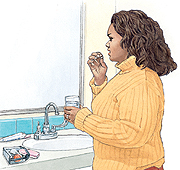Treating Pelvic Inflammatory Disease (PID) with Medications
As soon as PID has been diagnosed, it should be treated with antibiotics. Two or more types of antibiotics may be taken at the same time. This ensures that all the bacteria are killed. Take all of your medication as prescribed, or the infection may not go away.
For Mild Cases
Mild cases of PID can be treated at home. Antibiotic pills will likely be prescribed. You may also receive an injection of antibiotics.
For More Serious Cases
Severe cases of PID need to be treated in the hospital. There, you will receive antibiotics through an IV (intravenous) line. Your health will be closely monitored. The length of your hospital stay depends on how sick you are. After you leave the hospital, antibiotic pills will likely be prescribed. If complications have occurred, you may need surgery to help treat them.
Make Sure Your Partner Gets Treated
The bacteria that cause PID can also have harmful effects in men. Any partner you have had sex with in the past 60 days should be tested for chlamydia and gonorrhea. Your partner will most likely be treated with antibiotics as well.

Be sure to take your antibiotics every day until they're finished.
Follow all your healthcare provider's instructions. This will help you heal. During treatment:
-
Finish all of your antibiotics, even if you start to feel better. Otherwise, the infection might not go away. It could even get worse and become harder to treat.
-
Don't have sex until both you and your partner have finished all of your antibiotics.
-
Avoid activities that could let bacteria enter the upper genital tract, such as using tampons or douching.
-
Relieve pelvic pain with a heating pad, hot water bottle, or ice pack. Your healthcare provider may also suggest a prescription or over-the-counter pain medication.
-
Ask your healthcare provider if you should avoid alcohol, which can interfere with some antibiotics.
If You Take Birth Control Pills
When both you and your partner have finished your antibiotics, it's okay to have sex. You should know that some antibiotics can keep birth control pills from working. Use latex condoms or another form of protection for at least a month after your antibiotics are done. Also, keep taking your birth control pills on schedule. (Remember: Birth control pills help prevent pregnancy, but do not protect against STDs.)
If the Infection Returns
Even after treatment, PID can come back. This could happen if you're infected by another STD. But be aware that once you've had PID, bacteria that are normally harmless may be more likely to infect your upper genital tract. This means you could get PID again even without getting another STD. With each PID infection, the chances of complications go up.
While you're being treated for PID, call your healthcare provider if you have any of the following:

